Terror groups take advantage of power vacuums
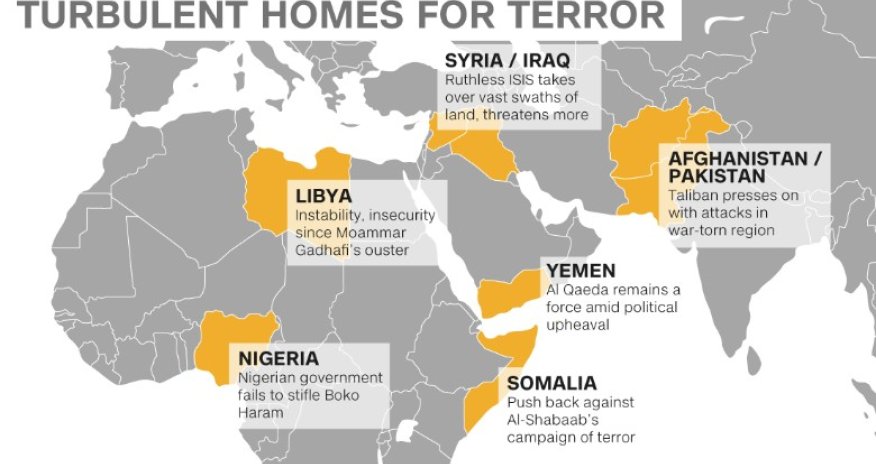
As leaders around the world say, terrorism can be anywhere.
But some places have it worse than others.
For all the well-founded worries in the West and elsewhere around the developed world, these kinds of locales are more likely stopping points than long-term homes for terror groups. Such violent, extremist organizations tend to gravitate toward less stable, more turbulent areas where they can operate more freely, recruit from a desperate populace and build up resources and momentum.
If there's a power vacuum, in other words, militant groups can more easily amass power. And that creates big problems for those trying to root them out at the source.
Below is a look at some places where terrorists are operating -- oftentimes in the absence of a central government with the resources to stop them -- and what is being done about them.
LIBYA
What's the threat?
Well-armed groups are increasingly asserting themselves in the North African nation. Some of them aim to ensure that their tribes have control of their future, while others are stepping up to prevent worse alternatives from taking over.
Such chaos has opened the door to terror, some of it coming from outside Libya's borders.
One chilling example came in 2012, when U.S. Ambassador Chris Stevens and three others died in an attack on the U.S. diplomatic compound in Benghazi, Libya. Three or four members of al Qaeda in the Arabian Peninsula participated in that incident, according to several sources who have spoken to CNN.
Then there's ISIS. The group's link to Libya first became clear in October, when amateur video showed a large crowd in Derna affiliated with the Shura Council for the Youth of Islam chanting their allegiance to ISIS leader Abu Bakr al-Baghdadi.
At that time, ISIS had up to 800 fighters in the area, plus training facilities in the nearby Green Mountains, sources told CNN. Al-Baghdadi would go on to characterize three Libyan "provinces" as being part of the Islamic State's "caliphate," with attacks in Tripoli and on a Libyan army checkpoint.
The most recent glaring example of ISIS' barbarity in Libya came in a video released Sunday. It showed the mass beheading of over a dozen members of Egypt's Coptic Christian minority, all dressed in orange with their hands cuffed behind them, at the hands of black-clad jihadists.
What's up with the government?
Three years ago, rebels backed by NATO aircraft toppled longtime dictator Moammar Gadhafi. Many saw this turnover as an opportunity for Libya to emerge as a more peaceful, more prosperous nation.
Neither has happened. Instead, Libya has been beset by ongoing fighting between Islamists and the weak, internationally recognized government.
That violence has seeped into the capital, where most embassies have closed and multiple bombings have occurred. Still, Tripoli is calm, relative to eastern Libya, where ISIS (and al Qaeda before it has thrived.
What's next?
Libya's central government appears powerless to stop groups like ISIS, at least in areas it doesn't firmly control. Others have tried to fill the breach.
In August, the U.N. Security Council unanimously approved a resolution calling for an immediate ceasefire in Libya and sanctions for those involved in violence there. Around the same time, U.S. Pentagon and State Department officials said they believed Egypt and the United Arab Emirates had been carrying out secret airstrikes against Islamist militants -- a claim apparently dismissed by a UAE minister and denied by Egyptian leaders.
Egypt, though, didn't deny its bombing of ISIS targets in Libya after the Christians' killings. "Avenging Egyptian blood and punishing criminals and murderers is our right and duty," its military said Monday, according to a statement broadcast on state TV.
Bernardino Leon, the United Nations envoy to Libya, has floated the idea of international monitors when a peace agreement between rival factions is hammered out. But "when" seems a long way off, despite the beginning of talks between rival factions in Geneva, Switzerland.
YEMEN
What's the threat?
The chief threat facing the average Yemeni may depend on whether he or she is Sunni, like 70% of the country, or Shiites, like the Houthi rebels that marched into the capital Sanaa, spurred the departures of Yemen's political leaders and asserted control. This violence and insecurity threatens citizens' ability to maintain their health, provide for their families and have much hope for a better future.
For the rest of the world, though, the biggest threat in Yemen is al Qaeda in the Arabian Peninsula.
The group, known as AQAP, is probably the most well known and most feared branch of the terrorist network. Yemen is where al Qaeda's glossy magazine, Inspire, is published, and where Anwar al-Awlaki -- an American who was one of the world's most prominent terrorists before dying in a drone strike -- was based.
Some of the West's biggest terrorism-related headlines in recent years have come from the work of AQAP in Yemen. In 2009 alone, U.S. Army Maj. Nidal Hasan exchanged emails with al-Awlaki before his deadly shooting rampage at Fort Hood, Texas. Then, on Christmas Day, Umar Farouk AbdulMutallab -- who later admitted traveling to Yemen and being inspired by al-Awlaki -- tried unsuccessfully to detonate explosives in his underwear on an Amsterdam-to-Detroit flight.
More recently, Cherif and Said Kouachi are both thought to have traveled to Yemen for terror training before carrying out last month's massacre at the Paris offices of satirical magazine Charlie Hebdo.
What's up with the government?
Who controls Yemen, and who will control Yemen, is very much up in the air.
There's no doubt that the Houthis, a group that's long felt marginalized in Yemen, are the pre-eminent power in Sanaa and elsewhere in the Arab nation.
Yet their takeover hasn't been smooth and it's no guarantee it will ever be complete. There has already been resistance from different groups in Yemen, particularly in the south, where there's a long-running secessionist movement, and in the oil-rich province of Marib to the east of Sanaa.
The United Nations-sponsored talks were aimed at breaking this impasse. But after two weeks, the Houthis declared these negotiations over and announced they will chart Yemen's political future by setting up groups to replace parliament and form a presidential council.
It's highly unlikely that this plan will ever be universally embraced. Nor is there any telling when or even if Yemen will become stable and secure.
What's next?
Amid all the chaos, country after country has shuttered their Sanaa embassies in recent weeks. Yemeni leaders are focused on the domestic situation. Meanwhile, the exit of President Abdu Rabu Mansour Hadi leaves the United States without a key ally in its fight against terror.
Al Qaeda has taken advantage. Just in the last week, its forces took over a military camp (and all its weaponry) and freed six fighters from a southern Yemeni prison, according to security officials.
Still, even if its diplomats and its longtime allies in Sanaa are gone, the United States military isn't leaving Yemen just yet. U.S. Special Forces personnel will continue to operate in Yemen, doing training missions with Yemeni forces and conducting counter-terrorism operations.
They proved as much late last month, with a drone strike that killed senior AQAP cleric Harith bin Ghazi al-Nadhari and three other people in Shabwa province.
NIGERIA
What's the threat?
While its name translates from the Hausa language to "Western education is forbidden," Boko Haram hasn't lashed out in the West like al Qaeda or ISIS. Still, it has managed to cause plenty of violence and mayhem in and around Nigeria.
This Islamist extremist group has gone after Nigerian troops, sure, but it's also shown little mercy for civilians. Deadly raids of peaceful villages, bombings of crowded markets and mass abductions -- most infamously the kidnapping of more than 200 girls from a school in Chibok -- are the grisly norm for Boko Haram.
'I will sell them,' Boko Haram leader says of abducted schoolgirls
The majority of its savagery has been concentrated in northeastern Nigeria, where the central government appears to have only a modicum of control.
And in recent months, Boko Haram has increasingly lashed out into neighboring countries. Deadly attacks have been reported in Cameroon, Chad and Niger, most of them in areas near those countries respective borders with Nigeria.
(CNN)
ANN.Az
Similar news
Similar news
























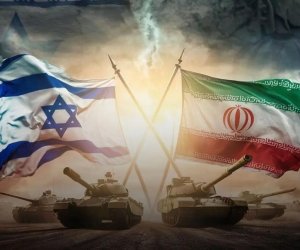
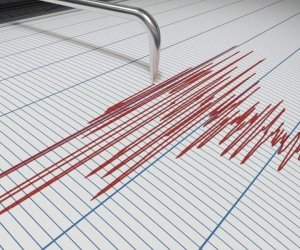

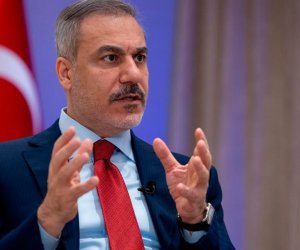
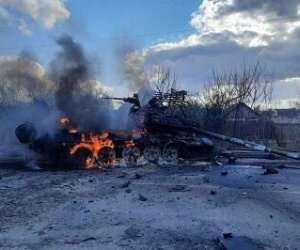







 Photo
Photo 



 Video
Video 

